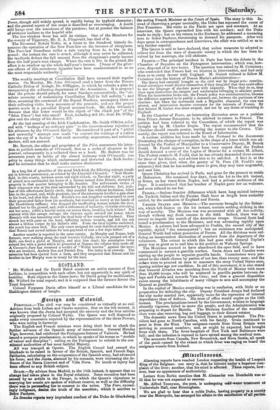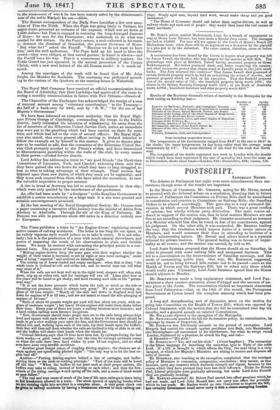Infsttllantous.
Alarming reports have reached London respecting the health of Leopold King of the Belgians: one story is, that he labours under a hopeless com- plaint of the liver; another, that his mind is affected. These reports, how- ever, bear no appearance of authenticity.
Letters from Berlin mention that M. Alexander von Humboldt was so ill that he was not expected to recover.
Mr. Alfred Tennyson, the poet, is undergoing odd-water treatment at Umberalade Hall, near Birmingham.
We are glad to hear that a noble Duke, having property in a county near the Metropolis, has arranged his affairs to the satisfaction of all parties, in the attainment of -1:vhioh he has been mainly aided by the disinterested- ness of the noble Marquis his son.—Globe.
The Roman correspondent of the bay News furnishes a few new anec- dotes of Pius the Ninth. When the Pope was going lately to Subiaco, his major-domo presented an estimate of the expense, which was set down at 2,000 dollars: but Pins is engaged in restoring the long-deranged finances of Rome: he sent for the Postmaster; who undertook to do what was needed for 400 dollars. On the Pope's return, a mob collected in his route, to • demand the dismissal of Grasselini, the present Governor of Route. "But what for?" asked the Pontiff. "Because we do not want to have him," said the mob spokesman. The Pope held up his hand to bless the droved—they were obliged, at that sacred gesture, to kneel in silence—and the Pontiff went his way. - Pius is a connoisseur in military matters: the Noble Guard has just appeared, in the annual procession of the Corpus Christi, with a new steel helmet of the old Roman model: it is much ad mired.
Among the marriages of the week will be found that of Mr. John Bright, the Member for Rochdale. The ceremony was performed accord- ing to the custom of the Quakers, at the meeting-house in Wakefield.
The Royal Mail Company have received an official communication from the Board of Admiralty, that their Lordships had approved of the route in- suring a monthly communication in future with New Orleans.—Standard.
The Chancellor of the Exchequer has acknowledged the receipt of a sum of unusual amount among "voluntary contributions" to the Treasury— the half of a bank-note for 5001., sent by "B. W.," "for the use of her Majesty's Government."
We have been informed on competent authority, that his Royal High- ness Prince George of Cambridge, commanding the troops in the Dublin district, lately intimated his intention of withdrawing his name from the list of members of the Hibernian United Service Club, unless an immediate stop were put to the gambling which had been carried on there for some time' and which had led to the ruin of several officers. His Royal High- ness also stated, that every general officer serving in Ireland intended to follow the example set by himself in this matter. It gives us sincere plea- sure to be enabled to add, that the committee of the Hibernian United Ser- vice Club promptly acceded to the Prince's wishes, and have determined to discountenance gambling within the walls of the club, by every means in their power.—United Service Gazette.
Lord Ashley has addressed a letter to "my good friends" the Short-time Committees of Lancaster, York, and Chester; exhorting them, now that they have gained the two hours for which they have so long struggled, to lose no time in taking advantage of their triumph. Their success has imposed upon them new duties, of which they must not be neglectful; and they must seek counsel from those who have aided the movement, to turn the valuable acquisition to proper account.
A rise in bread at Antwerp has led to serious disturbances in that city; which were only quelled by the interference of the gendarmes.
An offer had been made by "a foreigner" to the Brazilian Government to establish a cotton manufactory on a large scale if a site were granted and suitable encouragements promised.
At the last meeting of the Royal Geographical Society, Mr. Duncan read a paper containing a narrative of his journey into the interior of Africa from Aboiney to Adafoodia. Through the aid of the King of Dahomey, Mr. Duncan was able to penetrate about 460 miles in a direction entirely new to Europeans.
The Times publishes a letter by "An Engine-driver," explaining several active CRUSES of railway accidents. The letter is too long for our space, or its rudely vigorous style would induce us to take it entire. It is not scho- larly; but it is the production of a man with much natural shrewdness, and power of imparting the result of his observations in plain and forcible terms. We must be content with extracting the principal points in a con- densed form. The sources of danger are these-
" Making engine-drivers keep the same pace with their engines whether the weight of their trains is increased or not by eight pr nine more carriages," under pain of being " reported" and mulcted on Saturday night. The mixing up of heavy-loaded and empty carriages: when that is done, "the whole train is inclined to roll and strike out, and no mortal man can tell what may come of it."
When the rails are not kept well up to the right level, sleepers will often sink down, trip up on either end, and the carriages will run off. Lines after four or five years will be found to get shaky; and hard running soon tells on the "perma- nent way."
"It is not the down pressure which hurts the rails so much as the side or thrusting-out pressure, which is always very great." We are now running en- gines of 18 tons weight: "Nearly all the rails laid down in England were laid down for engines of 8 or 12 tons, and are not meant to stand the side-plunging of engines of 18 tons." '
"Rails of about 80 pounds weight per yard will last about ten years with en- gines of moderate weight"; but heavy 18-ton engines will make them shake before their time. Every year oithese ten years, a railway becomes more insecure; and a hard-ridden railway soon becomes aangerons.
" Now Government should make proper men see to the rails being always kept level and square with each other: and to do this, a heavy 18-ton engine should be shade to go a slow walking pace upon the line, and the Government men should go behind her, and, walking upon each of the rails, lay their hands upon the buffers; their feet will then tell them whether the rails are inclined to trip or slide in or out, and the buffers will shake their hands when the wheels jar.
"Colonel Sibthorp says that 70 lives have been lost by railways during the last three weeks,—a good round number: but the time for railways accidents comes on when the rails have been hard ridden by your 18-ton engines; and we shall soon have some very terrible accidents. '
"Another great danger comes of coupling driving-engines: the chances are al- ways against one speed being pitched right": "the only way is to let the best en- gine lead off."
Another—" Putting driving-engines behind a line of carriages, and buffer- driving them on the neck-or-nothing principle." "Part of the train will be bored off the line." "When the buffers do not meet each at their proper centres, the buffers may take to riding, instead of butting on each other; and then the fore- wheels of the riding carriage would spring off the rails, and a scene of blood would at once follow."
"The real and true cause of much of the loss of life upon railways is there being at few breakemen allowed to a train. The whole system of applying breaks when we are running right into accident is a complete sham. A very great check can be given to railway accidents by having a breaksznan allowed to each railway car- riage. Steady aged men, beyond hard work, wo.ild make class') and yet good breaksmen."
"The House of Commons should call before them engine-drivers, as well as railway clerks and such sort of people: they wouli then learn the real causes of many accidents."
Mr. Bonn's action against Mademoiselle Lind, for a breach of engagement to sing at Drury Lane Theatre, has been made a Special Jury cause. The damages are laid at 10,00W. The case will not appear in the Court of Queen's Bench till Michaelmas term; when there will be an argument on a demurrer by the plaintiff to a plea put in by the defendant. The cause cannot, therefore, come on before December.
A commission has been issued by the Crown to inquire what property WAS left by James Tawell, the Quaker, who was hanged for the murder at Salt Hill. The proceedings took place at Hertford, Tawell having possessed property at Great
Berkhempstead. His widow produced deeds and leases respecting estates; and the and other documents proved that shares stood in Tawell's name in two joint stock banks. The Jury returned this verdict—" That James Tawell died possessed of certain freehold property which he held on committing the crime of murder, and personal property which he held on his execution. That the freehold property was of the annual value of 711.- the leasehold property being worth 1001.; the shares in the Sydney Banking dompany worth MO!.; in the Bank of Australia worth 4,0001.; household furniture and other property worth 6201."
Results of the Registrar-General's return of mortality in the Metropolis for the week ending on Saturday last—
Total (Including unspecified causes) 840 914
The temperature of the thermometer ranged from 89.0° in the son to 28.00 In the shade; the mean temperature by day being colder than the average mean temperature by 412°. The mean direction of the wind for the week was North west.
The comparison of the deaths registered last week in London with the deaths which would have been registered if the rate of mortality had been the &IMO as in Dorsetshire, shows these totals—London, 840; Dersetshire, 684; excess, 166.
Number of Sprig deaths. average. Zymotle (or Epidemic, Endemic, and Contagious) Diseases 157 .. . lee
Dropsy, Cancer, and other diseases of uncertain or variable seat 87 .... le
Diseases of the Brain, Spinal Marrow, Nerves, and Senses . 137 ... 158 Diseases of the Lungs, and of the other Organ' of Respiration 1138 175
Diseases of the Heart and Blood.ressels 37 se Diseases of the Stomach, Liver, and other Organs of Digestion III 70 Diseases of the Kidneys, &e 13 a
childbirth, diseases of the Uterus, de 8 10 Rheumatism, diseum of the Bones, Joints, de. 10 8
Diseases of the Skin, Cellular Tissue, dm 0 9 0k1 Age 41 57
Violence, Privation, Cold, and Intemperance 52 aa



























 Previous page
Previous page